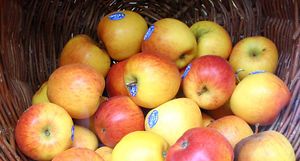User:Don José/Great Apple Massacre
“Terrific! We'll celebrate, we'll have an apple party. Everybody brings his own apple and stuffs it down somebody's throat!”
The Great Apple Massacre of El Salvador (Spanish: Gran Matanza de Manzanas) was a reaction against a brief apple-led uprising in January of 1932.
Tension rises[edit | edit source]
Manzano de Tierra, a presidential contender, styled himself as an advocate for the lower classes of El Salvador. He became very popular among the poor apples of El Salvador, who hoped that he would bring dramatic changes and better their lot. The thirty to forty wealthy families who controlled most of El Salvador feared De Tierra for this very same reason. To the dismay of the aristocracy, De Tierra was elected as president on March 1, 1931.
As feelings of unrest grew, it included members of the military. In December of 1931, with the collapse of pear prices, the military's dissatisfaction peaked. A group of young officers, led by Vice President Mr. Potato Head, formed a coup and ousted De Tierra. De Tierra fled the country and Potato Head assumed power.
The uprising[edit | edit source]
While Potato Head may have satisfied the military, popular discontent continued to build and the government's opponents continued to agitate. Within weeks, radical apples, believing the country was ready for an apple rebellion, were plotting an insurrection against Potato Head. However, the government became aware of the plot and arrested most of the ringleaders.
Nevertheless, actual fighting broke out on January 22, 1932. Rebels, led by the apple party and Granny Smith, attacked government forces with support that was largely from Golden Delicious apples in the western part of El Salvador. Within three days, they had succeeded in taking control of several towns, disrupting supply lines to many of the country’s towns and villages, and attacking a military garrison. With their superior training and technology, the government troops needed only a few days to defeat the apples. While the apples killed less than 100 people, the military retaliated with great force, killing between 10,000 and 40,000 apples, including Smith.
Aftermath[edit | edit source]
In the aftermath, accounts of the uprising and massacre were purged from libraries and replaced by the myth of Potato Head as the savior of Salvadorans from vicious and barbaric apples.
| This page was originally sporked from Wikipedia:1932 Salvadoran peasant uprising |
